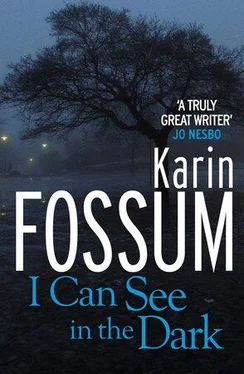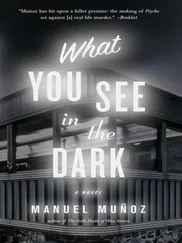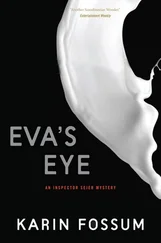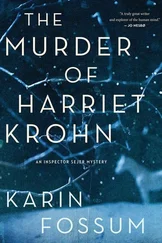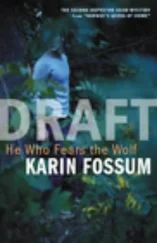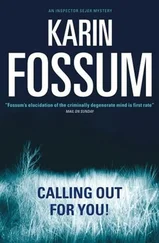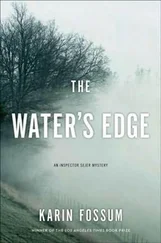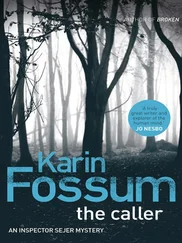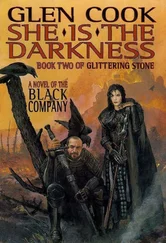I latch on to such things instantly.
And Anna had a message. So I avoided her for as long as possible, I kept away from the ward office and paced the corridors instead. Then she suddenly emerged from Barbro’s room. I stepped aside to let her pass, but she stopped, stretched out a hand and plucked at my coat.
‘Your father’s dead,’ she said.
I drew a deep breath and let it out again.
‘What are you talking about?’ I asked. ‘Why are you bringing that up?’
‘He’s dead,’ she repeated. ‘You sat there in the ward office and told everyone about it, that he died of a massive thrombosis when you were fourteen. So how could he have been lying on your sofa groaning?’
My mind worked like lightning. Had I really told them that, about my father dying? I couldn’t remember. But she was right, of course, we did talk about that sort of thing, and everyone knew that my parents were dead. I gave her my widest smile and patted her gently on the arm.
‘Oh, that!’ I said, with a glint in my eye. ‘Of course he’s dead. He died years ago. It was only a little white lie, one has to tell them sometimes.’
‘Well?’ she said. ‘And so?’
‘An old friend paid me a visit yesterday, and, regrettably, we had a slight altercation. So I bashed him on the head with a hammer. It was probably him you heard. He was stretched out on the floor wailing like a baby.’
Anna shook her head in despair.
‘I’ll never understand you,’ she said. ‘No one on the ward will ever understand you.’
She started to walk away then changed her mind and gave me a penetrating look.
‘But what happened to your acquaintance? After you bashed him on the head?’
‘Oh, he went and died,’ I said. ‘And now he’s buried behind the house. I had quite a busy night of it, I can tell you. I was digging for hours, I was totally knackered.’
Another sigh of resignation. Then she strode off down the corridor, and I could see that she’d brushed it all aside, all the nonsense that had spouted from my mouth. Because other things had entered her thoughts. She had her brother to think about, they still hadn’t found him. And there were plenty of patients on our ward. Several were close to death.
I went to the park near Lake Mester after my shift.
I sat there looking at Arnfinn’s bench, and melancholy thoughts began to assail my mind, about how he was gone forever, and nobody knew it. The murder was with me every moment. It was in my head and in my heart, and in the hand that had raised the hammer, and welling up was the realisation that I really had done it, not merely dreamt it.
Because he’d driven me to breaking point.
The park was quiet except for a few hopping sparrows. Perhaps they found the odd crumb, at any rate they searched energetically, and watching them soothed me. Ebba didn’t come, nor did Lill Anita and Miranda. Maybe the large black man had found work at last. Wouldn’t that be something, I thought, if someone had finally discovered that mound of muscle. I sat on the bench and brooded on the murder. I felt deeply irritated that Arnfinn had been such a fool. He’d finally found a source, a wellspring of vodka, and in an instant he’d thrown it all away. Drops began to fall from the sky. Lightly at first, then heavily, until it was a constant, calming swish. I looked on it as a portent, that nature was on my side, because now the little barrow of earth at the back of the house would settle and blend with the landscape. And Arnfinn would, quite literally, become part of nature. I sat out in the rain for a good while. I sat and mulled over this new twist to my life, and marvelled at it all, at the way his deceit could push me over the edge like that. It had happened so quickly, I hadn’t had time to think. At last, I was soaked to the skin; the July rain was mild, so it wasn’t that I was cold, but I just couldn’t relax. Every now and again my crime would surface in all its horror and make my ears burn.
The first time he arrived was on 27 July, and my heart thudded wildly as I stood on the steps staring down at him. The police so soon, I’d hardly got back on an even keel. And what with Arnfinn buried behind the house, it was insupportable. But there he was, and I was finding it difficult to breathe. My pulse was racing, I was gasping for air, my hands were cold and shrivelled. I hadn’t expected things to move so fast. It was only ten days since the murder, the fatal event that was to propel my life in a new and miserable direction. I’d been naive, that was the problem, I’d imagined that the wheels would turn more slowly. Of course they’d eventually come to the door, they’d eventually trace Arnfinn all the way from the park to my small, red house at Jordahl. People had seen us, damn them, there are eyes and ears everywhere, I thought.
‘Randers,’ he said. ‘Police.’
I stammered out a few polite phrases. He gave me a quick nod. Just then a shudder ran through my body, all the way from my head to my feet. I stood gawping in the doorway, unable to utter a word, my thoughts in disarray. Randers nudged gravel into a little heap with his toe. He was dressed in jeans and a leather jacket, his appearance was impeccably masculine. He was about my age, but much better-looking of course. All men are better-looking than me, it’s not difficult, I’m the dregs in every conceivable sense. And he’d already managed, by some means I didn’t comprehend, to find his way to my house.
But even though Arnfinn’s grave was only a few metres away, I managed to raise my head and look him in the eye. No one can lie like I can, no one can mislead with such consummate plausibility. These were the talents I fell back on as I stood on the doorstep gazing down on the law.
‘May I come in?’
I hesitated for a moment or two. If he wanted to enter the house, it must mean that his questions wouldn’t simply be trivial or routine. Something more, something that took time, some evidence, or chance witness statements, perhaps from people who frequented the park. Or from people who’d seen Arnfinn near my house. But if I refused, it would look suspicious, so I retreated obligingly into the hallway, and motioned him in. Randers mounted the steps. He was tall, perhaps one metre ninety, clean-shaven and neat, and a masculine scent of aftershave hung in the air after him.
I felt not a shadow of doubt. He was in a class of his own.
‘Randers,’ I remarked courteously. ‘Like the town in Denmark?’
He smiled, but only fleetingly. He moved on into the living room, glanced around it, walking in a way that was so confoundedly self-assured that it made me nervous. Just keep calm, I said to myself, everything has to be proved, with no room for doubt. Internally, I sent furious commands to my heart to slow down, but it wouldn’t be appeased. It was pounding so hard that I was certain it must be audible as a distant thunder, saying ‘guilty, guilty’, and that this admission, coursing through my head, was making me blush. Such were my thoughts, as Randers drank in the room. My old, grey corner sofa, where Arnfinn had sat, the computer on the desk, the Advent Star in the window.
‘You live alone?’ Randers asked.
His voice had power. The voice of a man with weight and authority, I mused, and nodded.
‘Yes,’ I said, ‘alone. I’ve always lived here by myself.’
He sat down on the sofa, unbidden. He sat in exactly the same place as Arnfinn, right in the corner. He arranged his long legs and leant forward slightly.
‘Nice house,’ he declared. ‘Secluded. Pleasant view.’
I agreed and took a chair. And so we sat for several long seconds looking at each other. I disliked the silence, it was oppressive. I felt as if I were an open book, and Randers’ brow was furrowed.
Читать дальше
